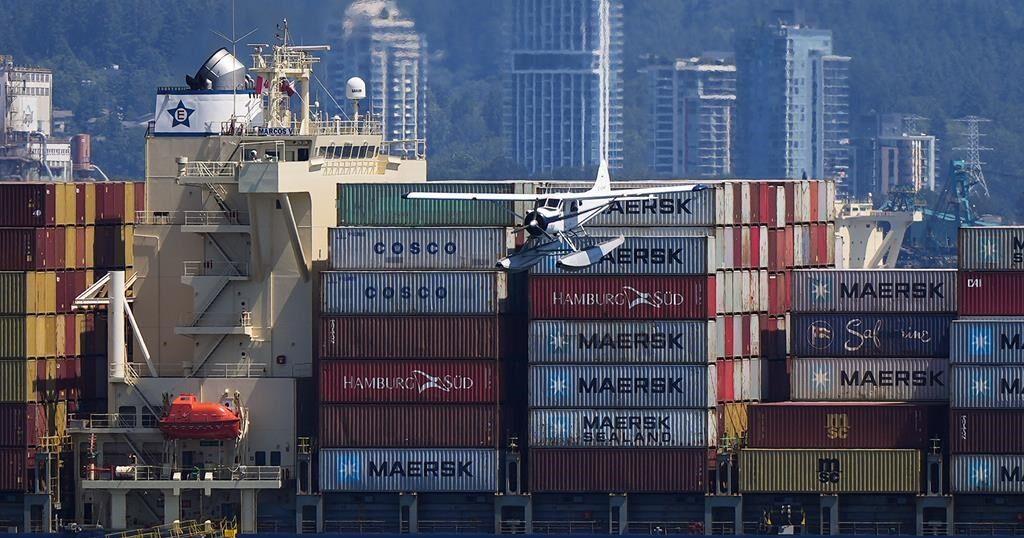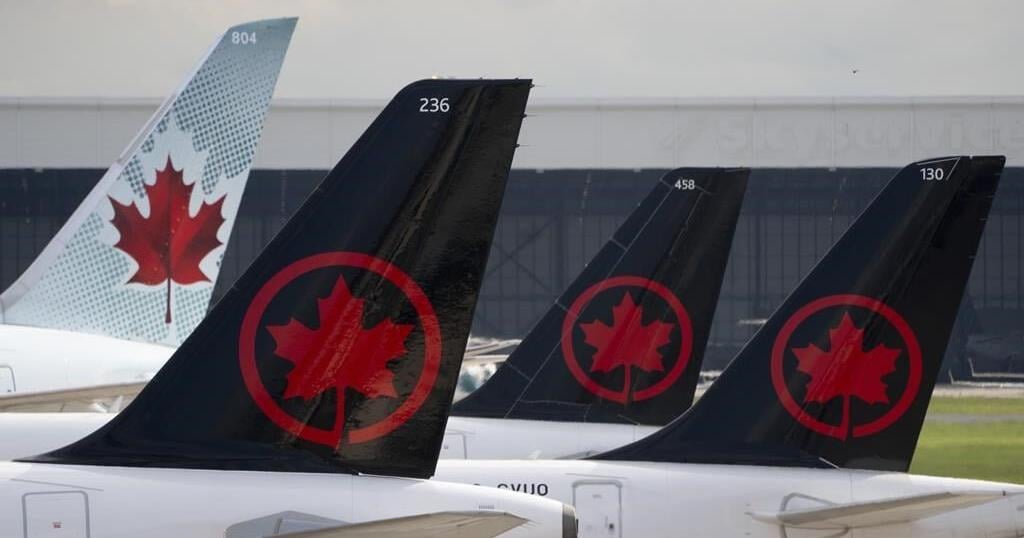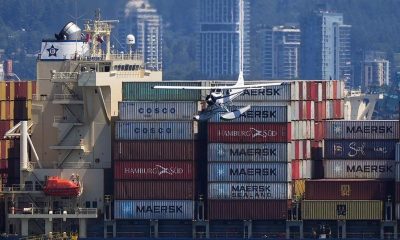VANCOUVER – Ports in British Columbia could potentially be paralyzed again starting next week as a lockout looms in the dispute between employers and the union representing more than 700 foremen.
The Canadian Chamber of Commerce said Friday the lockout coincides with an expanded job action at the Port of Montreal, bringing more uncertainty to Canada’s supply chain.
“It’s tremendously concerning to us, particularly because of the drumbeat of disruption that we’ve seen throughout the Canadian supply chain and the transport sector over the last 12 to 18 months,” said Matthew Holmes, executive vice-president at the Canadian Chamber of Commerce.
The BC Maritime Employers Association said Friday in a statement that it will “defensively” lock out members of the International Longshore and Warehouse Union Local 514 starting Monday at 8 a.m., shutting down all cargo operations provincewide but leaving cruise ships and operations for grain vessels unaffected.
The employers said the lockout is meant to “facilitate a safe and orderly wind-down of operations” in light of “escalating and unpredictable strike action,” as the union had issued a 72-hour strike notice for job action also starting Monday at 8 a.m.
“We did not arrive to this decision lightly,” the employers association said in its statement announcing the lockout. “This regretful action follows thorough consideration of ILWU Local 514’s continued intransigence and their provocative decision to proceed with another strike notice.”
In response, Local 514 president Frank Morena said in a union release that workers had only planned to “engage in limited job action” such as an overtime ban, and it was the employers who “completely overreacted” by threatening a “full-scale lockout.”
“Regardless of BCMEA provocations, we will take limited job action only starting Monday, Nov. 4 unless an agreement has (been) reached before then — and we are prepared to resume negotiations immediately,” Morena said in the statement.
He noted that workers are now “extremely angry” over the employers’ refusal to bargain major issues, such as staffing requirements as more automation is introduced at the ports, and the lockout is an “attempt to force the federal government to intervene in the dispute.”
There have already been a number of recent disruptions at the Port of Vancouver, Canada’s largest port, due to labour unrest.
The list includes a days-long picketing effort at several grain terminals in September, a work stoppage involving both major Canadian railways in August, and a port worker strike last year that lasted 13 days and froze billions in trade at the docks.
Expanded job action on Thursday at the Port of Montreal shut down two container terminals, stopping 40 per cent of the container capacity at Canada’s second largest port.
“It feels like the entire business fabric and connective tissue of our country is constantly under fire,” Holmes said. “And how do we have a viable economy for small business?”
He said 2023 saw the highest number of days lost to labour disputes across all Canadian industries since 1986, and the fear is that frequent disruptions to road, rail, ship and air traffic may add up to damage to Canada’s economy that can’t be easily corrected.
“When companies can’t get their goods into the ports in Canada, they have to go somewhere else,” he said. “When they go somewhere else, it doesn’t mean they come back here. And … we’ve seen that in previous disruptions.”
The union representing foremen in B.C. has said that employers have tried to “lower existing minimum manning levels” at ports across the province, with a Canada Industrial Relations Board document noting that Local 514 made a complaint in February that one employer — DP World — “failed to engage in bargaining on a manning agreement” and “purported to have the right to unilaterally implement automated rail operations” at its Vancouver container terminal.
The board ultimately decided to dismiss the union’s complaint, saying DP World’s practices “may not be conducive to harmonious labour relations” but the company had no legal duty or obligation to engage Local 514 on a manning proposal presented earlier this year.
Local 514 said its inability to negotiate with DP World as a single employer led to a vote among the membership “industry-wide” that resulted in a 96 per cent approval in September to authorize strike action if needed.
The union accuses the employers of not showing up for negotiations on Thursday, the last scheduled day of mediated talks this week, while also failing to notify others that they would not be participating.
The employers association says its final offer to the union remains open for workers to accept unless it is withdrawn, and the group is prepared to rescind the lockout notice if the union withdraws its strike notice.
Holmes said Canadian small businesses are not taking sides in either the disputes in B.C. or in Montreal, but added it has become clear that there is a “systemic problem” in labour dispute resolution in Canada and more action from federal government is needed to prevent disruptions.
He said some of the negative impact of disruptions can already be seen in Canada’s GDP, where August saw transportation and warehousing acting as a “drag” on the overall Canadian economy.
“It means we’re going to be poorer as a nation at the end of this year as a result of those few days and the time it took to get things moving again,” Holmes said. “And we’re going to see that again and again until we figure this out.”
This report by The Canadian Press was first published Nov. 1, 2024.























